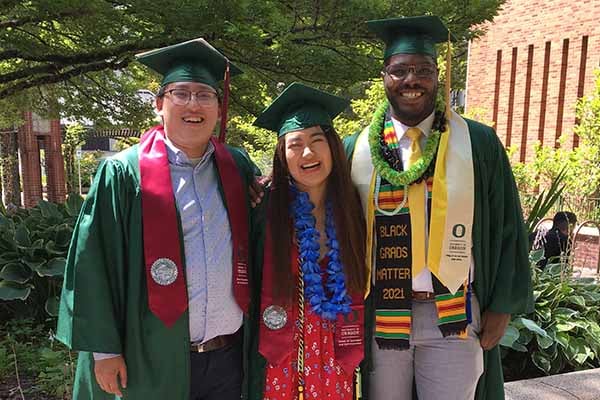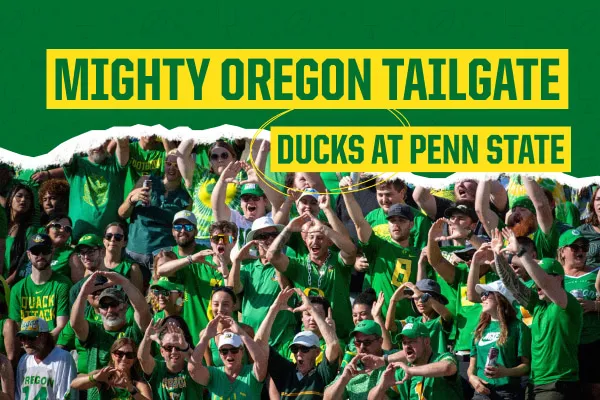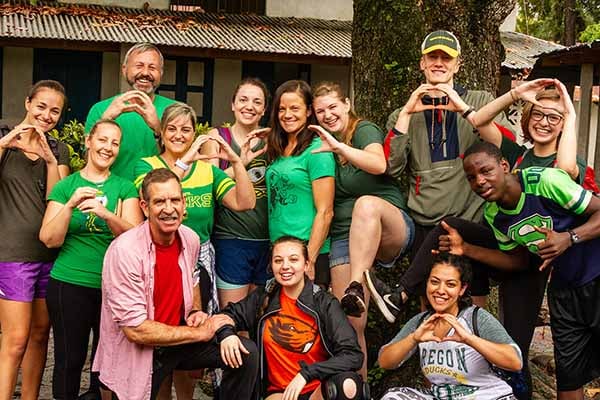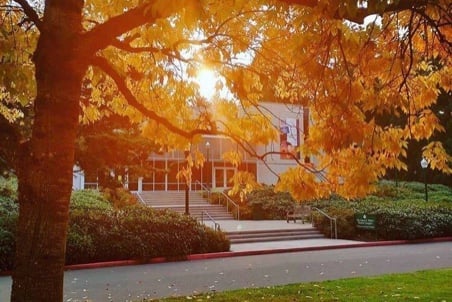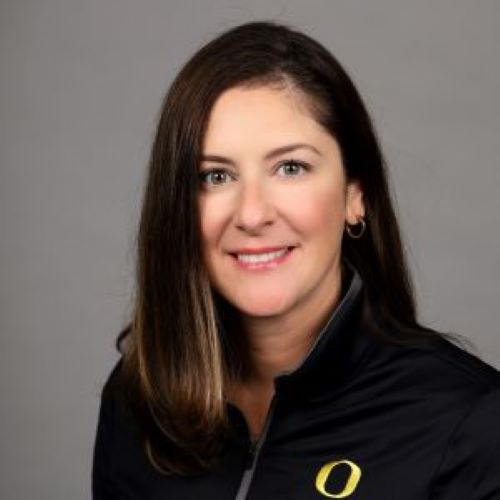
Elizabeth Ahern, BA ’00 (political science)
Employee Experience Leader, Adobe; UOAA Board of Directors
Part of the Daily Emerald’s “Alumni Take Flight” feature series
Written by Lauren Leone, UO student columnist
Elizabeth Ahern graduated from the University of Oregon in 2000 with a bachelor’s degree in political science. She currently works as an Employee Experience Leader at Adobe and is on the UO Alumni Association board of directors.
What drew you to study political science at the UO and what were the biggest takeaways from your studies and experiences while a student?
I chose the University of Oregon because I didn’t know what I wanted to do. Like many people, as a freshman, I was interested in different paths from sports medicine, to the sciences, to psychology, which are all areas of strength at the UO, so I knew I couldn’t go wrong. I knew it was a place where I could explore and find a major. I also loved the idea of adventure and living someplace different, which was part of my decision.
With political science specifically, I don’t think I was really aware of what it meant during the first few classes. What is political science? Why do people study that? What do you do with that after college? But the first few classes that I took really drew me in. It was the nexus of history as well as how we apply our history to the systems that work today. I didn’t feel like I was studying anymore. It was a lot of work, but it didn’t feel like work anymore. I was so interested in the topic, and I think that's always a great clue when you’re getting into the zone and just loving what you’re reading and really engaged in the writing assignments you have. And in political science, there is quite a lot of reading and writing.
As I got deeper into political science, my world got bigger, because especially at the UO, there are professors with deep expertise in other cultures, whether it’s ancient China or Eastern Europe. That piece of it was a moment of big expansion for me, which was really fun. I also did a business minor which has served me very well.
In retrospect, I don’t think I anticipated the impact that UO alumni and friends would have on my life. Truly lifelong friends. I’ve lived in Boston, Washington DC, and San Francisco, and no matter where I went, I tapped into that network.
Tell us about your career path since graduation and what inspired you to seek a career in HR and business partnership.
After graduating from the UO, and feeling the spirit of adventure from moving to different places, I was relatively confident I would find a job in these places. I now realize that was a part of the hubris of youth. Knowing no one and going to a new place and not having a job is quite scary to me now, but I did it right after school and I tried different things. I thought I might attend law school, so I worked in an intellectual property law firm, which was super interesting. And then I worked in DC on more core policy and communications work with a nonprofit.
In each of these experiences, I learned a ton. I kept in touch with a lot of people, but I knew it wasn’t necessarily going to be a long-term thing, so I just kept trying different things, and part of that was moving back to California. For me, it was just easier to live closer to family, and when I tapped into my network, I had a few job leads that were in recruiting. I thought. “Oh, well I’ve run an internship program and I’ve done this type of work, but probably not as a core job.” I decided to just give it a try, and that really led me to explore other areas of human resources or employee experience, which is what we call it.
After starting in recruitment, I began to explore other areas and just loved it. I loved working with teams and figuring out what was working and what was not for a particular team or organization. I worked beyond the talent recruitment area in compensation, as well as getting into business partnerships later on, which has allowed me to develop expertise that I can bring to any company or industry.
What key skills did you gain from your time at the UO that you now implement into your role?
I would say openness to new ideas. I still think about some of the professors that I had at the UO who held very different ideas and were willing to challenge mainstream thinking.You don’t come across these really interesting people all the time in your life. As I’ve matured in my career, I’ve learned that you always have to seek to understand different perspectives, and that’s what I love learning about people in my role.
I also have to give the business school credit because fundamental business acumen is really important if you want to operate in any business or nonprofit setting. Developing strong business acumen and the types of fundamental business skills that I gained from the UO was great.
What does your day-to-day look like at Adobe?
I always try to start my day by understanding what’s going on in the world, what may impact industry trends, and what’s going on in our larger macroeconomy. That’s been a huge focus point over the last few months, along with how that impacts our business. We have an employee experience program and a variety of initiatives that we run in support of our business. We spend a lot of time understanding where the business is today and what we need for future growth. I would say 95% of the day is spent collaborating in meetings, developing plans for each initiative, and working with individual teams on opportunities.
Recently, like many large-scale businesses, we ran an annual reward cycle. We figured out how to provide competitive rewards packages and how we can establish raises, bonuses, and equity to engage and be competitive in the marketplace for each of our individuals and teams.
What are your tips for effective networking and how can students build a professional network early on?
Learn to keep in touch with the people you meet. Being someone who keeps in touch is an art and whether it’s through text or social media, personal relationships are meaningful and really important. No matter what job you have, everyone you interact with is your network. It could be your manager, a VP, or your peer working for another organization. All of those people are part of your network. It’s really beneficial to just take time to get to know someone and build that relationship because you never know where those relationships will go.
What was your favorite memory at UO?
I have so many great memories but my favorite was graduation. Having my family experience Eugene and all the special places that my friends and I would go to was very impactful for me. Many of them had never been to Eugene and probably will never go again. I also really loved having Al Gore come to speak because he was running for president at the time. I think that moment influenced my eventual move to Washington, D.C.
Did you get involved in any campus programs and how do you think those set you up for a career after college?
I was involved in the Greek system. Whether you choose to do that or not, I think getting involved in any campus program provides leadership opportunities where you are in a position to work through problems, identify opportunities, and lead something that could have a positive impact.
I also always had three different jobs. I worked on campus at a bagel shop, I worked at a department store, and then I worked at a local nonprofit, The Relief Nursery, all at the same time. Even those work experiences are part of the great Eugene experience that I still really appreciate. You learn a lot about people through both having good managers and those where you might think “I’m not sure I would handle that the same way.” I think all of that provides a really good experience and learning for your career decisions later in life.



